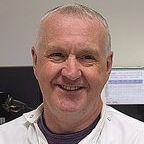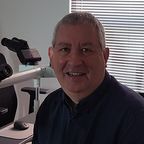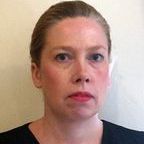Cellular Pathology
Introduction to tissue and tumours workshop
Tissues and Tumours Workshop
Introduction to tissue and tumours workshop
1pm – 1.10pm BST, 22 September 2025 ‐ 10 mins
Tissues and Tumours Workshop
Abstract
The tissues and tumours workshop is aimed at those who are yet to learn about the histological features of normal and abnormal tissues and also those who are need of a refresher or who may be studying for a qualification and wish to reacquaint themselves with a guided session on the microscopic features of normal and abnormal tissues.
Each case study will give an overview of the normal histology, showing the main structural and cellular features of the particular tissue.
Each study will then go on to feature the most common pathologies (inflammatory and or tumours) that may be encountered and show examples of the cellular and structural features that are associated with those specific pathologies.
Speakers
Chantell Hodgson
Scheme Manager , LabXCell CEO and UK NEQAS Cellular Pathology Technique (CPT) Scheme Director UK NEQAS for CPT
Distinguishing tumour tissue from normal tissue
Tissues and Tumours Workshop
Distinguishing tumour tissue from normal tissue
1.10pm – 2pm BST, 22 September 2025 ‐ 50 mins
Tissues and Tumours Workshop
Abstract
The presentation is designed to provide attendees with a basic understanding of the main histological features that differentiate normal cells from "abnormal" cells. The discussion will outline the physical characteristics that identify cells undergoing transitional states ranging from atrophy through to neoplasia and illustrate how these changes can be identified histologically in benign, in-situ and invasive tumours.
This basic understanding of cellular changes will be further expanded on by discussing the specific cellular changes that are commonly associated with tumours that arise in the breast, skin, colon and prostate. The presentation will be concluded by a brief outline of the parameters that define the terminology used to describe tumour differentiation.
This presentation is a small part of UK NEQAS CPT's continuous expansion of educational content and is designed to support participants undertaking completion of the IBMS Specialist Portfolio and as a general professional development aid for all cellular pathology scientists.
Speakers

Breast
Tissues and Tumours Workshop
Breast
2pm – 2.30pm BST, 22 September 2025 ‐ 30 mins
Tissues and Tumours Workshop
Speakers
Cassandra Cooklynn
Dissection Practitioner , Mersey and West Lancashire Teaching Hospitals NHS Trust
Respiratory
Tissues and Tumours Workshop
Respiratory
2.30pm – 3pm BST, 22 September 2025 ‐ 30 mins
Tissues and Tumours Workshop
Speakers

Upper and lower GI histology, the normal and not so normal
Tissues and Tumours Workshop
Upper and lower GI histology, the normal and not so normal
3.45pm – 4.15pm BST, 22 September 2025 ‐ 30 mins
Tissues and Tumours Workshop
Speakers
Gynaecological pathology for beginners
Tissues and Tumours Workshop
Gynaecological pathology for beginners
4.15pm – 4.45pm BST, 22 September 2025 ‐ 30 mins
Tissues and Tumours Workshop
Speakers

Gavin Regan FIBMS
Trainee Consultant Biomedical Scientist, University Hospital of Derby and Burton NHS Foundation Trust
Skin
Tissues and Tumours Workshop
Skin
4.45pm – 5.15pm BST, 22 September 2025 ‐ 30 mins
Tissues and Tumours Workshop
Abstract
The workshop will involve a brief overview of the structure and function of skin, the largest organ on the human body. An outline of the significant pathological inflammatory and cancer incidence of skin disease within the UK. The workshop will also include case studies involving both inflammatory as well as tumour investigations.
These case studies will reflect the application of investigative laboratory tests as well as prognostic testing in order to aid final diagnosis and assist in delivery of patient management outcomes.
Speakers

The role of immunohistochemistry markers in distinguishing benign from malignant sarcoma
Cellular Pathology
The role of immunohistochemistry markers in distinguishing benign from malignant sarcoma
9am – 9.15am BST, 23 September 2025 ‐ 15 mins
Cellular Pathology
Abstract
The diagnosis of benign and malignant soft tissue and bone neoplasms can be challenging due to their rarity and histological diversity. In recent years, immunohistochemistry has become increasingly important in aiding diagnosis of sarcoma due to development of new markers able to detect proteins of specific gene alteration. One of such markers is signal transducer and activator of transcription 6 (STAT6). STAT6 was established as valuable diagnostic immunohistochemistry marker, following detection of the recurrent gene fusion product NAB2-STAT6 in most solitary fibrous tumour. STAT6 is a highly sensitive and specific immunohistochemistry marker used to distinguishing solitary fibrous tumours from other morphological mimics.
Speakers

Targeted therapies in the treatment of gastric adenocarcinoma
Cellular Pathology
Targeted therapies in the treatment of gastric adenocarcinoma
9.15am – 9.30am BST, 23 September 2025 ‐ 15 mins
Cellular Pathology
Learning Outcomes
Delegates will gain knowledge on:
- Previous options for the treatment on non-resectable gastric and gastroesophageal carcinoma
- Newly established targeted therapies
- The importance of high quality immunocytochemical predictive testing;
- Future treatments on the horizon.
Speakers

Andrew Dodson MPhil, FIBMS, CSci
Scheme Director, UK NEQAS Immunocytochemistry & In-Situ Hybridisation (ICC & ISH)
How immunocytochemistry and molecular complement each other in the clinical setting
Cellular Pathology
How immunocytochemistry and molecular complement each other in the clinical setting
9.30am – 10am BST, 23 September 2025 ‐ 30 mins
Cellular Pathology
Abstract
Precision oncology relies on the accurate identification of diagnostic, prognostic and predictive biomarkers to guide patient management. This presentation explores the complementary roles of immunohistochemistry (IHC) and molecular testing in cancer diagnostics, using a patient case study to demonstrate their integration in clinical decision-making. IHC offers rapid, cost-effective assessment of protein expression aiding in tumour classification and serving as both a screening and confirmatory tool for predictive biomarkers linked to targeted therapies—for example, HER2 in breast cancer or ALK IHC and PD-L1 in lung cancer.
Molecular techniques such as PCR and next generation sequencing (NGS) provide detailed characterisation of genetic alterations, offering deeper insights into tumour biology and therapeutic opportunities. We will discuss the strengths and limitations of these methods and highlight the need for a multidisciplinary approach that incorporates both immunocytochemical and genomic technologies to support evolving standards in personalised cancer care.
This session is aimed at biomedical and clinical scientists across all levels, promoting a practical and advanced understanding of biomarker-driven diagnostics.
Learning outcomes
Delegates will:
- Learn about the role of Immunocytochemistry and Molecular analysis for diagnostic, prognostic and predictive purposes in the era of targeted cancer therapy
- Be able to identify the unique benefits and challenges of using immunocytochemistry and Molecular for comprehensive predictive biomarker testing
- Understand the need to match novel technologies and techniques in Immunocytochemistry and genomics to clinical need
Speakers

Predictive biomarker testing: current, evolving and emerging applications
Cellular Pathology
Predictive biomarker testing: current, evolving and emerging applications
10.30am – 11am BST, 23 September 2025 ‐ 30 mins
Cellular Pathology
Learning outcomes
This presentation will:
- Outline the importance of predictive biomarkers in cancer care
- Review established predictive biomarkers in various cancer types
- Explain challenges and limitations, especially regarding change of use or testing modifications
- Explore emerging biomarkers and changing applications of established markers in clinical practice
Speakers
The role of immunohistochemistry in diagnostic neuropathology of CNS tumours: A current update
Cellular Pathology
The role of immunohistochemistry in diagnostic neuropathology of CNS tumours: A current update
11am – 11.30am BST, 23 September 2025 ‐ 30 mins
Cellular Pathology
Abstract
Immunohistochemistry complements histological assessment and provides vital information about diagnosis and grading/prognosis of tumours. This talk is aimed to inform the audience of the significance of immunohistochemistry in diagnostic neuropathology, in particular those which are recently introduced and contributes towards integrated diagnosis of CNS tumours in line with the WHO classification guidelines. Furthermore, the role of some of the immunohistochemistry in deciding further molecular testing and interpretation of molecular results will be highlighted.
I will aim to include the key immunohistochemistry and molecular tests that would have relevance in UK NEQAS assessment system. Alongside, I will some share some relevant practical experience as a neuropathologist, working across both adult and paediatric settings and take questions.
Speakers

Dr Ashirward Merve
Great Ormond Street Hospital for Children NHS Foundation Trust and University College London Hospitals NHS Foundation Trust
Circulating tumour DNA (ctDNA) testing: The Marsden 360 Service
Cellular Pathology
Circulating tumour DNA (ctDNA) testing: The Marsden 360 Service
11.30am – 12pm BST, 23 September 2025 ‐ 30 mins
Cellular Pathology
Learning outcomes
Delegates will gain knowledge on:
- Introduction to ctDNA
- ctDNA testing in lung cancer
- Benefits and limitations of ctDNA testing
- An overview of the Guardant 360 workflow
- Interpretation of results
Speakers

Special staining excellence from a quality assessment perspective
Cellular Pathology
Special staining excellence from a quality assessment perspective
9am – 9.30am BST, 24 September 2025 ‐ 30 mins
Cellular Pathology
Abstract
Special stains continue to play a critical role in diagnostic histopathology, underpinning the identification and characterisation of a wide range of tissue components, organisms, and pathological processes. However, variability in staining quality remains a significant concern, with implications for diagnostic accuracy, reproducibility, and patient safety.
This presentation provides an in-depth analysis of special staining quality from the perspective of External Quality Assessment (EQA), drawing on performance data and trend analysis from UK NEQAS Cellular Pathology Techniques (CPT). Common technical deficiencies—such as inconsistent staining intensity, background staining, reagent degradation, and protocol non-conformance—will be discussed, alongside their potential impact on diagnostic interpretation.
Emphasis will be placed on the role of structured feedback, educational interventions, and scheme developments in driving technical excellence and harmonisation across services.
This talk will be of particular interest to biomedical scientists, laboratory managers, and quality leads aiming to enhance special stain reliability and align with evolving standards in cellular pathology.
Learning outcomes
Delegates will understand:
- How External Quality Assessment (EQA) programs influence the quality of special staining in histology laboratories
- the importance of quality standards
- Performance evaluation
- Troubleshooting through interactive learning.
Speakers

“This is the Way” – helpful tips to improve microtomy, cryotomy and embedding
Cellular Pathology
“This is the Way” – helpful tips to improve microtomy, cryotomy and embedding
9.30am – 10am BST, 24 September 2025 ‐ 30 mins
Cellular Pathology
Abstract
The presentation is designed to provide cellular pathology scientists of all levels of experience with some practical guidance and knowledge that may be of use in aiding them to deliver high quality or enhance their technical skills.
The subject matter will include simple, common place practical guidance and knowledge in areas of specimen embedding, paraffin sectioning and cryotomy. The content may be common knowledge to many attendees, but due to the time restraints and financial pressures currently experienced by cellular pathology laboratories, hands on training time has become more limited, so the content may well be useful. Trainees and even more experienced scientists may have missed out on some of the small, but very important, bits of advice and practical tips that are invariably usually passed on by the more experienced members of the cellular pathology laboratory.
This presentation is a small part of UK NEQAS CPT's continuous expansion of educational content and is designed to support participants undertaking completion of the IBMS Specialist Portfolio and as a general professional development aid for all cellular pathology scientists.
Learning outcomes
Delegates will be able to:
- Understand that different tissue types require specific orientation during embedding
- Recognise that incorrect orientation can directly compromise section quality
- Recognise that the integrity of wax throughout a block is important to section quality
- Understand that the mechanics of microtomes and cryostats can directly influence section quality
- Recognise the key factors that compromise section quality during microtomy/cryotomy and how they can be mitigated
Speakers

Importance of the effects of pre-analytic variables that effect quality across the tissue journey and downstream testing
Cellular Pathology
Importance of the effects of pre-analytic variables that effect quality across the tissue journey and downstream testing
10.30am – 11am BST, 24 September 2025 ‐ 30 mins
Cellular Pathology
Learning outcomes
Delegates will gain knowledge on:
- Key pre-analytical stages that are important for high quality tissue testing.
- Importance of engagement of multidisciplinary personnel in the tissue journey.
- Importance of Quality assurance to mitigate errors in laboratory testing.
- The impact of pre-analytical errors on patient care.
- Best practice for sample handling to provide high quality downstream testing
Speakers

Dawn Wilkinson
Deputy Scheme Manager , UK NEQAS Immunocytochemistry & In-Situ Hybridisation (ICC & ISH)
Troubleshooting your immunohistochemistry beyond the basics
Cellular Pathology
Troubleshooting your immunohistochemistry beyond the basics
11am – 11.30am BST, 24 September 2025 ‐ 30 mins
Cellular Pathology
Abstract
Immunocytochemistry is a valuable tool used to aid diagnostic pathology; commonly used to diagnose cancer, predict treatment response, and determine the likely outcomes of the disease. It is therefore vitally important that the immunohistochemical test is carried out accurately and reliably.
The presentation will highlight the importance of good quality immunohistochemical stains, and why this is essential for correct diagnostic interpretation. Examples of sub-optimal versus optimal immunohistochemical preparations will be presented, alongside troubleshooting scenarios.
Speakers
Slow Mohs procedures – rapid paraffin processing with patient management issues and laboratory challenges included
Cellular Pathology
Slow Mohs procedures – rapid paraffin processing with patient management issues and laboratory challenges included
11.30am – 12pm BST, 24 September 2025 ‐ 30 mins
Cellular Pathology
Learning outcomes
Delegates will:
- Understand The Principles Of Slow Mohs.
- Develop An Understanding Slow Mohs Procedures.
- Develop To Be Able To Identify Challenges During Slow Mohs Procedures.
- Develop an understanding of the equipment required in Slow Mohs procedures.
Speakers

Achieving 10 day turnaround in Histopathology: Transforming workflows for speed and precision
Cellular Pathology
Achieving 10 day turnaround in Histopathology: Transforming workflows for speed and precision
2pm – 2.30pm BST, 24 September 2025 ‐ 30 mins
Cellular Pathology
Abstract
This presentation will cover:
- Strategic Risk Management for Timely Diagnostics
Participants will learn how to balance risk with bold decision-making to drive rapid turnaround times, understanding when to take calculated risks while maintaining patient safety and diagnostic accuracy. - Mastering Challenging Conversations for Change
Attendees will understand the skills required to navigate and facilitate challenging conversations with stakeholders, including clinical teams, pathologists, and administrative leaders, to align on goals and address potential resistance to accelerated workflows. - Implementing Lean Workflows in Histopathology
Participants will explore Lean principles and workflow optimisation techniques specific to histopathology, gaining insights on how to eliminate inefficiencies and streamline processes to support a 10-day turnaround target. - Cultivating a Culture of Continuous Improvement
Attendees will learn strategies to foster a culture that embraces change, encourages innovative thinking, and promotes teamwork across departments, empowering staff to drive ongoing improvements in turnaround times while sustaining high-quality standards
Speakers

Paul Chenery
Cellular Pathology Service Manager & Deputy Pathology Directorate, Nottingham University Hospitals NHS Trust
“The Boy Stood on the Burning Deck” – maintaining and developing a Cellular Pathology laboratory in the midst of a crisis
Cellular Pathology
“The Boy Stood on the Burning Deck” – maintaining and developing a Cellular Pathology laboratory in the midst of a crisis
2.30pm – 3pm BST, 24 September 2025 ‐ 30 mins
Cellular Pathology
Abstract
Cellular Pathology Services have been under immense pressure as services undergo seismic shifts in delivery models and adoption of technology, post COVID. This presentation describes a personal journey of service development against this backdrop.
Learning Outcomes
- Learning from each other
- Understanding process and flow
- Importance of retaining the patient at the centre of all we do
Speakers

Scott Gable
Laboratory and Mortuary Service Manager, Cardiff and Vale University Health Board
Resilience in the workplace: Navigating burnout and stress
Cellular Pathology
Resilience in the workplace: Navigating burnout and stress
3pm – 3.30pm BST, 24 September 2025 ‐ 30 mins
Cellular Pathology
Learning outcomes
Delegates attending this presentation will:
- Recognise Early Signs of Burnout and How to Address Them:
Identify common signs of burnout and understand ways to manage them before they become overwhelming. - Understand How Workplace Stress Impacts Health and Resilience:
Learn about the effects of workplace stress and why managing it is crucial for sustaining well-being. - Explore the Role of Nutrition and Lifestyle in Supporting Resilience:
Discover how simple choices around nutrition and lifestyle can help healthcare workers stay resilient and handle daily pressures. - Develop Practical Strategies to Build a Resilient Work Life:
Take away effective, easy-to-apply steps to strengthen resilience and maintain a sustainable, healthy approach to work.
Speakers

Building a Cellular Pathology business case – justifying laboratory needs
Cellular Pathology
Building a Cellular Pathology business case – justifying laboratory needs
4pm – 4.30pm BST, 24 September 2025 ‐ 30 mins
Cellular Pathology
Learning outcomes
Delegates will have knowledge on:
- An understanding of the process
- How to support your Business Case
- Awareness of your audience
Speakers

Rob Hughes BSc CSci FIBMS
Directorate Operational Manager, Cellular Pathology, PathLinks, Northern Lincolnshire and Goole NHS Foundation Trust
How does the Cellular Pathology laboratory ensure the best possible patient outcomes for people with lung cancer?
Cellular Pathology
How does the Cellular Pathology laboratory ensure the best possible patient outcomes for people with lung cancer?
4.30pm – 5pm BST, 24 September 2025 ‐ 30 mins
Cellular Pathology
Abstract
Recent advances in lung cancer diagnostics within cellular pathology have significantly transformed patient outcomes, driven by innovations in molecular techniques and collaborative clinical practice. The integration of next-generation sequencing (NGS) has enabled earlier and more precise detection of non-small cell lung cancer (NSCLC) subtypes, particularly those with actionable mutations such as EGFR, ALK, and ROS1 . These diagnostic breakthroughs have not only improved prognostic accuracy but also facilitated targeted therapies, enhancing progression-free and overall survival rates.
Central to the successful implementation of these technologies is the role of multidisciplinary teamwork. Effective collaboration between pathologists, oncologists, radiologists, and Biomedical Scientists ensures the timely and accurate interpretation of complex diagnostic data. This team-based approach fosters a culture of shared responsibility and continuous learning, which is essential in adapting to rapidly evolving diagnostic standards. It also demonstrates how the Health and Care Professions Council (HCPC) standards have been instrumental in maintaining high-quality practice.
This presentation explores how technological advancements, interprofessional collaboration, and regulatory frameworks collectively shape the future of lung cancer diagnostics, highlighting the critical role of cellular pathology in delivering personalized and effective cancer care.
Learning outcomes
Delegates will:
- Know the advances in lung cancer diagnostics
- Understand the impact of the HCPC standards on daily working practises
- Appreciate the impact of teamwork on patient outcomes
Speakers

Digital pathology and AI innovation in cellular pathology
Cellular Pathology
Digital pathology and AI innovation in cellular pathology
9am – 9.30am BST, 25 September 2025 ‐ 30 mins
Cellular Pathology
Speakers

Dr Muhammad Aslam MBBS, FRCPATH, MBA (Health care)
Consultant Pathologist, National Clinical Lead for Wales to support digital pathology and AI implementation projects, Betsi Cadwaladr University Health Board
The need for standards in digital histopathology
Cellular Pathology
The need for standards in digital histopathology
9.30am – 10am BST, 25 September 2025 ‐ 30 mins
Cellular Pathology
Abstract
There are many variables in the histopathology workflow which may cause variation between slides. With the adoption of digital pathology, further variables are introduced through digitisation processes and viewing methodologies. Despite this, there are currently no routinely used methods to assess or quantify variables in the digital pathology workflow, including for routine H&E staining and digitisation processes. As such, laboratories use a variety of reagents, protocols and equipment resulting in wide image variation for slides stained with 'the same' stains.
External Quality Assurance programmes and the ability of humans to adapt to variation have ensured clinical consistency and efficacy over the years however, with digital pathology, AI can struggle with variability which can impact upon algorithm development and deployment, particularly across institutions.
This presentation will present a range of test tools that quantify variables in the digital pathology workflow. It will also discuss the importance of the introduction of guidelines and standards in digital pathology to help to reduce variation at its source, which would provide more valuable, consistent datasets for the onward development, and successful deployment, of AI in pathology.
Learning outcomes
Delegates will gain knowledge on:
- Current standards in digital histopathology
- Quality control in digital histopathology
- Additional standardisation required in digital histopathology
Speakers

The role of the biomedical scientist in histopathology AI
Cellular Pathology
The role of the biomedical scientist in histopathology AI
10.30am – 11am BST, 25 September 2025 ‐ 30 mins
Cellular Pathology
Abstract
Digital pathology is increasingly gaining traction in the UK with the potential for pathway improvements and faster diagnosis. However, the ultimate goal for digital pathology is to unlock the potential for computational analysis/AI to address challenges of the increasing demand for diagnostics and the limited pathologist workforce. But AI has many challenges to overcome before it can be widely adopted and realise the benefits. These include the continued roll out and adoption of the digital infrastructure, transparency/trust, validation and generalisability.
This presentation will consider the digital image pathway and highlight the areas where the biomedical scientist could have a material impact on the success of AI in digital pathology; some of these may surprise you!
Learning outcomes
This presentation will:
- Provide an understanding of artificial intelligence
- Outline how artificial intelligence is used clinical in histopathology
- Outline how biomedical scientists can aid with the adoption of artificial intelligence in histopathology
Speakers

Professor David Brettle
Trust Chief Scientific Officer, National Pathology Imaging Cooperative
Pilot project to measure and correct for device-independent colour calibration in whole slide images
Cellular Pathology
Pilot project to measure and correct for device-independent colour calibration in whole slide images
11am – 11.30am BST, 25 September 2025 ‐ 30 mins
Cellular Pathology
Learning outcomes
This persentation will cover:
- The variance in Digital Pathology slide scanners
- The importance of correct colour representation
- Methods for calculating and potentially correcting for difference in colours
- An opportunity to contribute to an expanding research project
Speakers

UKAS accreditation of Digital Pathology and Artifical Intelligence
Cellular Pathology
UKAS accreditation of Digital Pathology and Artifical Intelligence
11.30am – 12pm BST, 25 September 2025 ‐ 30 mins
Cellular Pathology
Abstract
Digital pathology and artificial intelligence are current and future growth areas across the whole of Healthcare. This talk will offer support to laboratory staff considering implementing digital pathology and/or AI systems, with regard to accreditation requirements. It will cover preparation for a UKAS application and assessment, including key relevant clauses of ISO 15189:2022, as well as looking at common pitfalls seen during extension to scope applications.
Learning outcomes
Delegates will:
- Learn how to prepare for a UKAS accreditation/extension to scope of digital pathology and AI
- Understand common pitfalls of UKAS extension to scope
- Be able to identify the key considerations when accrediting a digital pathology & AI solution
Speakers

Meet The Experts
Cellular Pathology
Meet The Experts
12.45pm – 2pm BST, 25 September 2025 ‐ 1 hour 15 mins
Cellular Pathology
Speakers
Chantell Hodgson
Scheme Manager , LabXCell CEO and UK NEQAS Cellular Pathology Technique (CPT) Scheme Director UK NEQAS for CPT
Dr Matt Griffiths
Principal Lecturer in Cellular Pathology, Nottingham Trent University
Cassandra Cooklynn
Dissection Practitioner , Mersey and West Lancashire Teaching Hospitals NHS Trust

Histopathology Reporting qualifications update
Cellular Pathology
Histopathology Reporting qualifications update
2pm – 2.20pm BST, 25 September 2025 ‐ 20 mins
Cellular Pathology
Abstract
The session will provide an overview of the Histopathology Reporting qualifications outlining the successes so far.
It will briefly outline the eligibility criteria for the qualifications, the assessment methods and the support needed by candidates from colleagues in order to undertake the qualification.
It will conclude with the plans of the Conjoint Board for the future.
Speakers

A malignant smooth muscle tumour: Grade 3 leiomyosarcoma of the uterus
Cellular Pathology
A malignant smooth muscle tumour: Grade 3 leiomyosarcoma of the uterus
2.20pm – 2.40pm BST, 25 September 2025 ‐ 20 mins
Cellular Pathology
Learning Outcomes
Delegates will gain gain knowledge on:
- The clinical and radiological presentation of this lesion, and other uterine mesenchymal neoplasms.
- The macroscopic handling and block selection of such cases.
- The histomorphology and the immunohistochemical phenotype of leiomyosarcoma, and important differential diagnoses that must be considered.
- Molecular testing and its emerging role in uterine mesenchymal neoplasms.
Speakers

Peter Smith
Consultant Clinical Scientist, Liverpool University Hospitals NHS Foundation Trust
Immunohistochemistry and melanoma: Spotlight on PRAME
Cellular Pathology
Immunohistochemistry and melanoma: Spotlight on PRAME
2.40pm – 3pm BST, 25 September 2025 ‐ 20 mins
Cellular Pathology
Abstract
This presentation highlights the role of PRAME immunohistochemistry in melanoma diagnosis and management. It will cover its utility in differentiating benign from malignant melanocytic lesions and its application in margin assessment during Mohs micrographic surgery, along with key technical and interpretive considerations.
Learing outcomes
Delegates will gain knowledge of:
- Understand the Role of PRAME - the significance of PRAME as an IHC marker and the role it plays within melanocytic studies - helping to assist in differentiating between benign and malignant populations.
- Diagnostic Applications - examples of PRAME within the diagnostic setting e.g. benign naevi vs melanoma or within margin assessment studies within staged excision therapeutic strategies (e.g. slow Mohs in cases of lentigo maligna melanoma (LM).
- Technical insights into PRAME IHC - cover interpretation/scoring systems within routine practice. Potential for double labelling strategies within the assessment of LM and other entities.
- Challenges - evaluate current challenges in the use of PRAME within routine practice
Speakers

Rapid molecular testing within histopathology laboratories – the application of molecular screening using Idylla
Cellular Pathology
Rapid molecular testing within histopathology laboratories – the application of molecular screening using Idylla
3pm – 3.30pm BST, 25 September 2025 ‐ 30 mins
Cellular Pathology
Learning outcomes
Delegates will:
- Understand the principles of rapid molecular testing
- Understanding principles of the Idylla technology
- Develop an understanding of the clinical importance of rapid molecular testing and its significance within the patient treatment pathway
- Develop an understanding of the scope and range of screening tests available.
- Be able to emphasise the importance of staff training and development
Speakers

Opening and Closing Plenary programmes


























